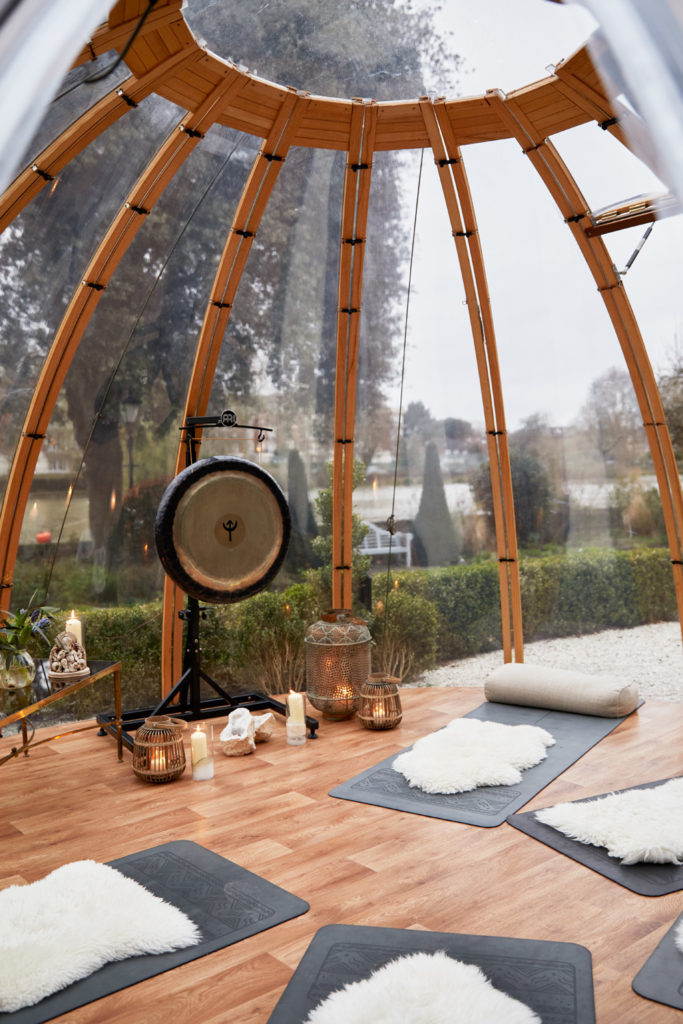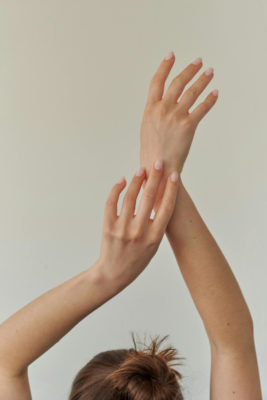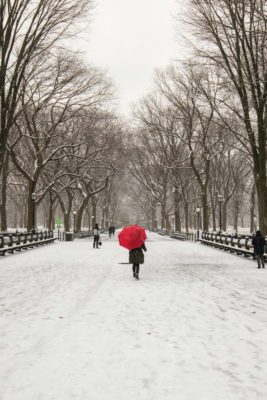
Can The Winter Solstice Really Impact Your Skin?
By
7 months ago
Plus, how to tweak your skincare routine for the occasion
It’s almost that time of year again. With the days becoming shorter, the cold creeping in and the end of the year close by, we’re quickly approaching the winter solstice. There are plenty of stories, traditions and celebrations associated with the winter solstice – but its impact on our skin is something we’ve been mulling over for a while. So, does it impact our skin? And how? Industry experts tell all.
A Guide To Winter Solstice Skin
What Is The Winter Solstice?
Taking place annually, the winter solstice is the day of the year when the sun is at its lowest point in the sky, resulting in the shortest amount of daylight and the longest night. The astronomical event happens twice a year, once in each hemisphere, when one of Earth’s poles is tilted farthest away from the sun.
When Is It?
In the Northern Hemisphere, it typically occurs between 21 December and 23 December, while in the Southern Hemisphere, it takes place around 20 June to 22 June.
In the UK, the next winter solstice is expected to take place on 21 December 2024.
@deadlyviperr You can find the @SpaLife Beauty winter soltice bundle exclusively at @target 🫶🏼 #spalifebeauty #wintersolstice #createmomentsofyou #gifted ♬ It’s on Tonight – Copyright Free House Music
Can The Winter Solstice Impact Your Skin?
In short, yes – and more than you might think. Expect all the similar symptoms associated with a particularly frosty winter: dry, tight and irritated skin.
‘The reduced daylight and colder temperatures that winter solstice brings can definitely impact your skin each year,’ confirms facial aesthetics practitioner Dr Raffaella Gabassi, who notes dryness as a key side effect. ‘Cold air can lead to dryness and dehydration. Inside, heating strips moisture from the air, contributing to rough texture and irritation.’
‘Dry skin is incredibly common as there is less humidity in the air, meaning there is less moisture for the skin to retain,’ adds Dr Leah Totton, medical doctor, cosmetic specialist and founder of Dr Leah Cosmetic Skin Clinics. ‘It is not only the cold air that can cause dry skin, but also when the heating is on as the air will become dryer, and hot showers. Our skin can often feel tight, and sometimes even sensitive and itchy. The dry air and colder temperatures may also worsen conditions such as eczema and psoriasis.’
There’s also the lack of sunlight to consider. ‘During this season, reduced sunlight can affect your skin’s natural production of Vitamin D, which plays a key role in maintaining healthy skin,’ highlights Amy Peterson, a Miami-based medical aesthetician and founder of the Skincare by Amy Peterson Clinic. The result? Pale and dull-looking skin that is more prone to irritation.
@dr.mamina Tips and tricks to protect your skin in colder weather. If you find these helpful, be sure to save & share with a friend! #skincareroutine #winterskincare #skincareessentials #skincaretips #dermatologist #drmamina ♬ original sound – Dr. Mamina Turegano, MD
How To Tweak Your Skincare For The Winter Solstice
And with the above to consider, it’s worth making the effort to level up your skincare routine for the winter solstice. Our experts share their top tips and swaps below:
Nail Your Technique
The first thing you need is a clear routine, geared towards nourishing and hydrating the skin. ‘To adapt your skincare routine for winter, switch to a cream-based cleanser to avoid stripping natural oils,’ recommends Dr Gabassi. ‘Next, opt for a hydrating serum with hyaluronic acid or glycerin, and add a layer of thicker moisturiser to lock in hydration. This layering technique is key.’
Invest In A Good Moisturiser
With a rough idea of what to expect from your routine, now you can lock in on the products you want to use. Up first: moisturiser. ‘A moisturiser is key in the winter,’ emphasises Dr Totton. ‘You may find you want to switch to a richer formula during the winter to protect the skin, and look for one that contains soothing properties if your skin is especially dry.’
Winter generally promotes much dryer skin than any other season, regardless of how mild it may actually feel (depending on where you are in the world). ‘To combat the negative impacts of the winter solstice on your skin, it is essential to focus on hydration and protection,’ reaffirms Amy. ‘Although Miami has a milder winter, the lower humidity can still lead to dehydration. Incorporating a heavy moisturizer and a hydrating serum into your routine can help lock in moisture.’
‘You don’t need to change every product you use, but you should switch to heavier creams during winter,’ adds London-based aesthetic doctor Dr Ivy Igerc. ‘Around this time, I recommend that my patients cut back on products that have alpha hydroxy acid or beta hydroxy acid. These products are excellent to help combat signs of ageing, but can be irritating to the skin even when combined with moisturising creams. You need creams that are richer in hyaluronic acid or have skin probiotics to protect the good bacteria in skin as well as the skin barrier. I also suggest creams with exosomes in them, which is the best way to rejuvenate the skin and boost collagen while hydrating the skin during colder months.’
Get started with our pick of the best moisturisers here.
Avoid Over-Cleansing
And then you’ll want to find the right cleanser. As Dr Gabassi noted above, a cream-based cleanser is ideal for the winter months – but it’s best to avoid over-cleansing where possible, as this will strip the skin of its natural oils. ‘Ensure you are not over cleansing (cleansing too often or using too much product),’ warns Dr Lean. ‘This can dry the skin out more. I would recommend double cleansing to those who have worn makeup throughout the day, or have worn a mineral based SPF and have reapplied this many times.’
Use A Mild Exfoliator
There’s also less need to exfoliate the skin during the winter solstice, as again this can damage the skin if done too much. But don’t avoid it altogether. ‘Regular exfoliation is also key, as it helps remove dead skin cells and promotes cell turnover,’ notes Dr Gabassi.
‘Skin tends to be drier and flaky during winter, so you only need to use a mild exfoliator around one or two times per week to slough off dead skin,’ adds Dr Ivy.
A gentler approach to exfoliating should improve the appearance of your skin, with Amy noting how it can ‘help remove dead skin cells and allow your products to penetrate better.’
@pickleflipflops my fav winter spf 😫 #pickleflipflops – #skin1004 #sunserum #skin1004sunserum #centella #sunscreen #spf #nowhitecast #glowyskin #skincare #kbeauty #clearskin #skincare ♬ original sound – frieda
Opt For Products With Hyaluronic Acid
And the buzzword ingredient of the season? Hyaluronic acid (or HA). ‘Look to include formulas that contain hyaluronic acid,’ emphasises Dr Totton. ‘Hyaluronic acid helps the skin to retain moisture, promoting hydration, wound healing and skin elasticity. It may also be able to reduce the appearance of wrinkles and fine lines, increase plumpness and can protect the skin of free radicals.’
Keep Up The SPF
Just because the sky is overcast doesn’t mean you should skimp out on using SPF, either. ‘It is really important to still wear an SPF everyday in the winter,’ highlights Dr Totton. ‘A common misconception is that SPF is only needed in the summer. However, the sun’s UV rays are still extremely strong in the winter, so ensure you are wearing high factor SPF to protect against skin cancers and premature ageing.’
‘I always advise my clients to apply sunscreen daily, as UV rays can still harm the skin in winter, particularly with reflective snow,’ adds Dr Gabassi. ‘I also recognise the importance of natural sunlight, especially during the winter months, for your overall health – so get outside, but protect yourself.’
Use A Face Mask
A little skin treat every so often is also good practice for the winter solstice. ‘To keep your skin glowing throughout the winter, consistency is key,’ highlights Amy. ‘Along with adjusting your daily skincare routine, I recommend adding hydrating and nourishing masks to your weekly regimen for an extra boost of moisture.’
You can browse our pick of the best luxury face masks for all skin types here.
Featured image: Arun Sharma, Unsplash










